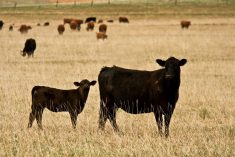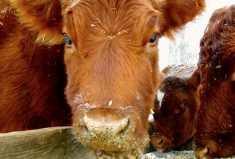Western Canadian feeder cattle markets were quite variable throughout the week due to the uncertain price structure in the deferred position. Yearling prices differentiated by nearly $15 across the Prairies while lighter calves were relatively unchanged from week-ago levels.
Adverse weather throughout January and February has tempered demand for replacement cattle. Southern Alberta has received over 200 per cent of normal precipitation which has occurred with below-average temperatures. Therefore, the rate of gain has lagged, resulting in lower feedlot profitability. It’s been difficult to bring in fresh replacements under the current conditions and buyers are factoring in a higher death loss. On top of this, feedlot operators are factoring a sharp year-over-year increase in beef production during the summer months. The margin structure is expected to deteriorate on the high-priced calves purchased last fall.
Read Also

U.S. not ready to lift Mexican cattle ban over screwworm, Agriculture Secretary Rollins says
The U.S. is not yet ready to reopen its border to Mexican cattle amid an outbreak of the flesh-eating New World screwworm parasite, Agriculture Secretary Brooke Rollins said, but she is pleased with Mexico’s efforts to contain the pest.
Larger-frame medium-flesh Charolais mixed yearling steers averaging 900 lbs. traded in the range of $182-$184 in eastern Saskatchewan early in the week. On Friday, similar-weight and -quality cattle were trading in the range of $170-$173 in southern Alberta. Larger-frame medium- to heavier-flesh mixed heifers averaging 850 lbs. traded for $168 in central Alberta.
A robust calf market showed no signs of fading, with buyers of grass cattle outbidding any feedlot interest. Drier conditions in the U.S. southern Plains have resulted in an abnormal placement schedule, which could make yearlings in July and August extremely precious. Deferred feeder cattle futures appear to be incorporating a risk premium due to the uncertainty in available supplies. Black Angus-based steers averaging 533 lbs. traded for $240 in central Alberta while similar-quality heifers were quoted at $201.
The feed grains market is on fire, which is also limiting the upside on feeder cattle. Barley supplies will drop to historically low levels by the end of the year. Corn is being railed into southern Alberta but the adverse weather has caused a backlog in rail movement. It’s come to the point that if the feedlot cannot secure feed grains, they’re not buying feeder cattle. Some key feedlot buyers have actually dropped out of the market for the time being until barley and corn prices stabilize. Those who step forward are incorporating a risk discount on yearling purchases, because barley prices could rally an additional $20-$30 per tonne quite easily.
— Jerry Klassen manages the Canadian office of Swiss-based grain trader GAP SA Grains and Produits Ltd. and is president and founder of Resilient Capital, specializing in proprietary commodity futures trading and market analysis. Jerry consults with feedlots on risk management and writes a weekly cattle market commentary. He can be reached at 204-504-8339.













